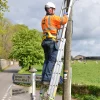UPDATE Home Office Clarifies Internet Snooping Plans to Smaller ISPs
The weight of the Government’s controversial new Internet Snooping legislation (Investigatory Powers Bill) will not fall on the shoulders of the market’s smallest broadband providers, but even if it did they wouldn’t be able to tell you about it because the biggest ISPs want them all gagged.
The above was the outcome from a recent (Tuesday) meeting between the Home Office and representatives of the UK Internet Service Provider’s Association (ISPA), which included a number of smaller broadband ISPs. The meeting was set-up to discuss the many technical, legal and cost concerns that surround the Government’s new snooping bill (here and here).
Advertisement
In case you’ve been living in a cave for the past few few weeks, the Investigatory Powers Bill was launched earlier this month and its aim is to force ISPs into keeping a much more extensive log (Internet Connection Records) of their customers online activity (regardless of whether or not you’re suspected of a crime), which can then be supplied upon request.
Mercifully the outspoken boss of AAISP (Andrews & Arnold), Adrian Kennard, was present at the event and has since provided a useful breakdown of the proceedings, which we’ve summarised into eight key points below. Adrian has also produced a full response via the written call for evidence (here), which is well worth a read.
It’s worth pointing out that the meeting itself wasn’t designed to address the wider privacy issues.
Summary of Key Meeting Points (IPBill)
1. The Government already has data retention orders with the biggest broadband ISPs under the existing regime and they told the smaller providers that, going forwards, the expectation was for such orders to continue to only be served upon the big boys.
2. Providers also wanted to know what an Internet Connection Record (ICR) actually constituted. Interestingly the Government said this was down to what they could agree with the ISP, which seems to be in conflict with the bill where an ICR is expressed as if it should be something more specific.
However ISPs were also told that they would not be expected to log information for which they do not have the capability, or to log any “third party data” or “over the top services“; the latter usually references services like IPTV etc.
3. The logging of so-called Internet Connection Records (ICR) would come from operators that have web proxies and or GCNAT equipment. The latter allows a single IP address to be shared between several users, such as when you’re short on spare IPv4 addresses.
4. The ISPs demanded that the bill should include some reassurances to reflect what they had been told above. A similar request was made to help clarify the issue of cost and cost recovery for implementation of the new system (Government claimed 100% cost recovery).
5. Apparently the bill does have to consider cost and impact on the ISPs business when making an order, and they confirmed that ISPs must be consulted first. This would make it very difficult to force a more complex and thus overly expensive system upon ISPs (e.g. DPI), especially smaller providers.
6. The Government gave ISPs an example of a useful log, which could show when a person last accessed Twitter or Facebook etc. (such as before somebody goes missing in the real-world). The ISPs correctly advised that this was a bad example and wouldn’t work as intended because most social networks are now almost constantly connected 24/7 in the background (feeding you notifications and updates etc.), which would limit the use of such logs. The Internet is very dynamic.
7. The ISPs asked if the Government wanted Domain Name System (DNS) logs, but they had no clear answer and couldn’t yet rule it out.
8. Interestingly it was claimed by the Home Office that the big broadband ISPs are the ones who actually asked for the gagging order. As a result ISPs will be effectively silenced because the bill says they must not disclose the existence or content of a data “retention notice“. This came as a surprise, not least since the big ISPs could surely choose not to disclose such activity (i.e. without a gagging order being needed in the first place).
Overall ISPs left the Government with a request for certain aspects (see above) to be made clearer on the face of the bill, which is something that has been a problem so far due to the often ambiguous language of its text.
Advertisement
Equally if the measures only fall on the biggest providers then surely terrorists and cyber criminals could simply swap to smaller ISPs in order to avoid the problem, not that they’d be able to tell you about it of course. Certainly there are lot of grey areas, which could benefit from further clarity, and not a lot of time for debate has been allowed.
In the meantime it looks as if the Government still have a lot of work to do.
UPDATE 28th Nov 2015
It’s worth adding that the Home Secretary, Theresa May, has now only given the bill three weeks of scrutiny in order to drive the legislation through parliament in the New Year. By comparison the previous attempt (Communications Data Bill) was given 5 months of parliamentary scrutiny before ministers decided the powers contained within the Bill went too far.
Advertisement
Previously Theresa May had told MPs that the Bill would “receive careful Parliamentary scrutiny“, but this appears to have been untruthful.
Lord Strasburger, who sat on the joint committee of the draft Communications Data Bill and who will sit on the new joint select committee, said, “Ridiculous. Committee scrutinising massive Investigatory Powers Bill given just 2 weeks to hear witnesses. Govt turning it into rubber stamp.”
Mark is a professional technology writer, IT consultant and computer engineer from Dorset (England), he also founded ISPreview in 1999 and enjoys analysing the latest telecoms and broadband developments. Find me on X (Twitter), Mastodon, Facebook, BlueSky, Threads.net and Linkedin.
« CityFibre Commits to Build Glasgow an Ultrafast Fibre Optic Network
Essex Broadband Project Benefits from GBP1.9m BT Clawback »


















































Comments are closed